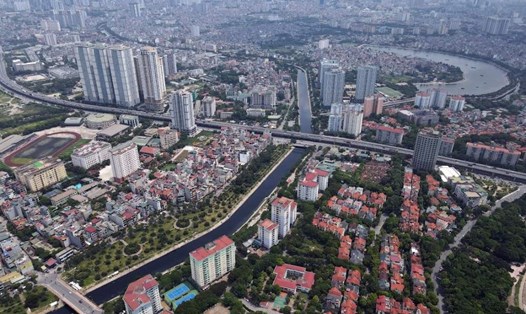On the morning of September 9, Deputy Prime Minister Tran Hong Ha chaired a meeting with ministries and branches to listen to reports and give comments on the Draft Law on amended Urban and Rural Planning (D draft Law); Draft Resolution of the National Assembly Standing Committee on urban classification and guidance documents (D draft Resolution).
According to the Deputy Prime Minister, the current Planning Law adjusts most types of planning: National, regional, provincial, and sector. However, in parallel, the Law on Urban and Rural Planning and the Law on Construction still exist, adjusting many contents related to urban and rural planning.
As a result, in the same space, a province, a commune, a ward... have many coexisting plans: Land use planning, construction planning, urban - rural planning, zoning planning... The situation of "one area, many plans" makes the management and allocation of land resources, human resources, resources... complicated and unfeasible.
In addition, according to the law, planning must be prepared in the correct order: From general planning to zoning planning, then detailed planning. However, in reality, many places only have general planning, then many years of zoning, making detailed planning unfounded. This " prospective disorder" causes congestion, even conflict when implementing the project.
" Planning should have been a scientific tool for allocating and using resources, but now there are overlaps and conflicts, leading to problems for thousands of projects across the country," the Deputy Prime Minister pointed out.
Regarding the Draft Law, the Deputy Prime Minister proposed two approaches for amendment. One is to build urban planning and rural planning as a full-space planning type, which can replace some other planning (such as land use planning, provincial planning, city planning). This planning must include general planning, zoning planning, and detailed planning for urban areas, provinces, and cities.
Two is to integrate urban and rural planning into higher-level planning (provincial planning, national master plan). At that time, the general planning of provinces and centrally run cities will play a main planning role, limiting the situation of many parallel plans.
The Deputy Prime Minister also noted that urban planning cannot be separated from urban management and technical infrastructure, especially water supply and drainage. "A city without infrastructure cannot be considered a true city. Planning must be linked to management work, a tool for development management," he emphasized.
Regarding the need to review the maintenance of two legal systems, one on general planning, one on urban and rural planning, the Deputy Prime Minister raised the issue: If urban and rural planning has its own characteristics, it can be integrated into a chapter in the Planning Law, instead of allowing it to cause conflicts in parallel.
Regarding the content of urban classification criteria, the Deputy Prime Minister suggested that the drafting agency (Ministry of Construction) should study the criteria for urban classification scientifically, include them directly in the law, and become a legal and scientific basis for planning work.
"This amendment must be determined to change the thinking and thoroughly overcome the shortcomings of the urban and rural planning system," the Deputy Prime Minister concluded.






